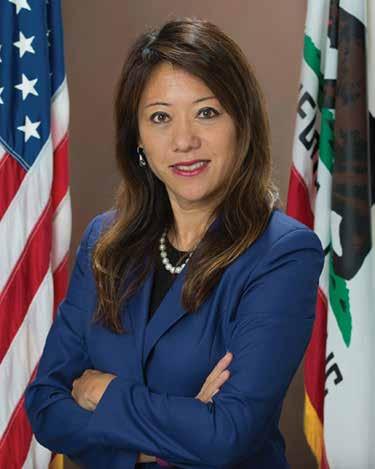
4 minute read
State Treasurer Fiona Ma o cially announces candidacy for Lt Gov
Backed with key endorsements and funding, Ma seeks to become state’s first elected Asian American and second elected woman Lieutenant Governor
SACRAMENTO – State Treasurer Fiona Ma on
Advertisement

Wednesday, May 31 formally announced her bid to become California’s Lieutenant Governor in 2026.
Ma, a Democrat and Certified Public Accountant, would be the state’s first elected Asian American Lieutenant Governor and the second woman elected to the position. She would also be the first CPA to be elected Lt. Governor of the state.
“With more than two decades of experience in public office, I am uniquely qualified to be California’s second-highest ranking elected official — where I will continue to be a powerful advocate for improving our state’s housing supply, environment, education systems and economy,” said Treasurer Ma. “California needs proven leadership to take on bold action to meet our ambitious climate change and energy goals, level the playing field and attract better quality jobs for all Californians while expanding access to healthcare, housing and education. I am committed to ensuring California remains an economic leader and powerhouse, investing in the small, family-owned businesses and the people that are the foundation of our success.”
Ma, 57, has been serving as California’s 34th State Treasurer since 2019. She was first elected on November 6, 2018 with more votes (7,825,587) than any other candidate for Treasurer in the state's history. She is the first woman of color and the first woman Certified Public Accountant (CPA) elected to the position.
As the state’s banker, Ma helped steer the state’s finances through the COVID-19 pandemic. She has grown and revamped the state’s affordable housing and homeless housing programs, funded clean energy projects to create new jobs, and dramatically increased Californians’ ability to save for college, retirement, live with a disability and achieve a better quality of life. At the same time, she has bolstered support for K-12 and higher education. She also has been a strong advocate of divestment from fossil fuels at the state’s pension funds. Her office processes $2.5 trillion in payments within a typical year and provides transparency and oversight for the government’s investment portfolio and accounts, as well as for the state’s surplus funds. Treasurer Ma oversees an investment portfolio that currently averages over $200 billion – a significant portion of which is beneficially owned by more than 2,200 local governments in California. She serves as agent of sale for all state bonds and is trustee of billions of dollars of state indebtedness.
Ma previously served as a member of the California Board of Equalization from 2015 to 2019 and the California State Assembly from 2006 to 2012.
She has built a reputation as a solution-oriented public servant and adept at building unlikely coalitions to overcome California's most complex problems. Prior to serving as Speaker pro Tempore, she was Assembly Majority Whip and built coalitions during a state budget crisis to pass groundbreaking legislation that protected public education and the environment while expanding access to health care. As an Assembly Member, she authored 60 bills that were signed into law by two different governors. Her successful legislation to ban toxic chemicals in baby products, known as phthalates, became a model for federal legislation that was authored by U.S. Senator Dianne Feinstein in 2008. She chaired the Assembly Select Committee on Domestic Violence and
More and more AAPI families choosing CA charter public schools for their child’s education
Charter schools are helping students succeed in college, career and life
AS student enrollment in public schools across the state continues to change, one notable trend is the large increase in Asian American & Pacific Islander (AAPI) families choosing a charter public school for their child’s education over the past decade.
According to an enrollment analysis by the California Charter Schools Association (CCSA) of California Department of Education (CDE) data, AAPI enrollment in charter public schools grew by 78 percent from 2012-2023, outpacing enrollment growth for all students (66 percent).

AAPI students now represent six percent of charter public school students in 2023, up from three percent in 2012. These numbers suggest a growing sentiment that charter public schools provide the education options that parents and students want in a public school.
Some of the most common AAPI background of students at charter public schools include Vietnamese, Filipino, Chinese, and Korean. Charter public schools like the O’Farrell Charter School in San Diego and Yav Pem Suab in Sacramento were founded to bring high-quality educational options to AAPI communities.
“For three decades, charter public schools across California have offered families the opportunity for their children to receive a high-quality education with the rigor and supports needed to help students enter college and succeed,” said Mr. Oliver Sicat, Chief Executive Officer & Co-Founder of Ednovate Schools and a Board Member of the USC Asian Pacific Alumni Association. “Charter schools offer families the opportunity to be creative with design, curriculum, and supports to ensure students don’t just finish high school but are positioned well for what comes next: to enter college and succeed.”
Ednovate schools are a network of public, tuition-free, high-performing college prep high schools in Los Angeles and Orange County that primarily serve first-generation college-bound students. They have a 99 percent college acceptance rate for their students.

California charter public schools are preparing students for college with focused learning content in the areas of science, technology, engineering, and math (STEM), global studies, language immersion, and various arts programs. As a result, charter public school students are being prepared to succeed in college, career, and life regardless of race, gender, religion, or zip code.
CCSA’s report Charter Public School Students in Focus: Asian American & Pacific Islanders found that AAPI charter school students from low-income communities outperform their traditional public school counterparts in both English Language Arts (ELA) and Math, on average. This difference is more strongly seen in ELA, where 44 percent of charter school students met or exceeded grade-level standards, compared to only 30 percent of district students.
“Students of all backgrounds deserve educational opportunities as creative and responsive to their varied interests as they are,








